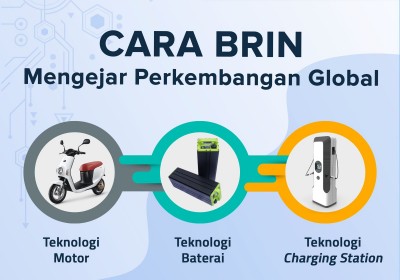Indonesia’s Research Institutions Supporting the Development of the Electric Vehicle Industry
January 10, 2022
JAKARTA – For the past two years, sales of electric vehicles in Indonesia have increased quite rapidly.
Based on data on the number of Type Test Registration Certificates (SRUT) from the Ministry of Transportation (Kemenhub), sales of four-wheeled electric vehicles experienced the largest increase in 2021, growing 4x until August 2021, compared to the same period in 2020. As of August 2021, SRUT issuances for two-wheeled electric vehicles increased by 3x, reaching 7,526 issues.
Although still far below sales of conventional vehicles, the numbers show the high interest shown by Indonesians in using electric vehicles. However, several key obstacles, such as the price of said vehicles and its batteries, the minimal after-sales support at this time and the lack of infrastructure to accommodate the vehicles are still preventing many others to adopt.
The Head of the National Research and Innovation Agency (BRIN) Laksana Tri Handoko said that research and innovation activities on electric vehicles could become an important point to prepare the domestic industry to support the era of electric vehicles in Indonesia.
“For one, regulations and incentives must also be synergized in order to affirm the government’s commitment. The government’s priority in this field is to slow down and ultimately stop sales of conventional vehicles in the country by 2040 for two wheelers and 2050 for four wheelers,” Handoko elaborated in a written statement on Tuesday (23/11).
Handoko explained that the BRIN is ready to accommodate and provide solutions to tackle problems such as low critical mass and to become a collaboration hub and multi-stakeholder enabler both domestically and abroad. The government has begun to prepare an electric vehicle ecosystem after the issuance of Presidential Decreee (PP) no. 55/2019 concerning the Acceleration of Battery-Based Electric Motor Vehicles for Road Transportation.
“Although the development of the electric car industry has been accelerating at a good pace, especially in the last three years, BRIN would need to focus on three key technologies, namely automotive technology, battery technology and charging station technologies in order for Indoensia’s industry to catch up with global developments,” he said.
According to Handoko, mastering these technologies must also be balanced with the calculation of the government’s domestically-sourced components requirement (TKDN) for battery-based electric motor vehicles. This is in accordance with the Industry Ministry’s (Kemenperin) Regulation no. 27/2020 concerning the Specifications, Development Roadmaps, and Provisions for the Calculation of Domestic Component Levels for Domestic Motor Vehicles for Battery-Based Electric Motor Vehicles.
“Fulfilling TKDN requirements must be considered when developing the battery-based electric motor vehicle ecosystem. Our researchers must work hard to develop new technologies for electric cars and to answer the bottleneck of these three crucial technologies so that battery-based electric vehicles that have high TKDN compositions can be produced,” he said.
Indonesian Muslim Fashion and Cosmetics IKMs Shine at Dubai World Expo 2020
Govt Steps Up UMKM Transformation Efforts in the Midst of Pandemic Slowdown
Govt Encourages Promotion of IKM Products in Digital Era
Government Begins Developing Maritime Training Center in Makassar
Government Educates Indonesian Businesses on Entering Middle Eastern Markets
Tweets by IDDevForum
